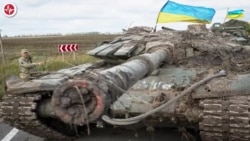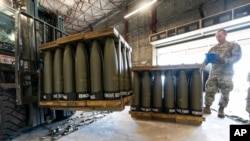On September 12, Jun Wu Ji, a popular military blogger on China’s Twitter-like messaging platform Weibo, posted a video titled, “This is big – U.S. general revealed that NATO’s goal is to dissolve the Russian Federation.”
A video in the post started with news that the United States was giving $675 million more in security aid to Ukraine for its war against Russian invaders. The video said:
“The United States and the European countries are enthusiastic about helping Ukraine – they claim that it was to protect the sovereignty of Ukraine, but they actually have their own goals to achieve.”
It then cut to shots of an interview by Times Radio with the general, with a voice-over that said:
“On September 11, U.S. General Ben Hodges, former Commander of EUCOM, said that the goal of the U.S. and [other] NATO countries is to ‘dissolve the Russian Federation.’
“… Hodges also said that NATO should be prepared to completely destroy Russia, unlike the destruction of the USSR, only getting half the results with double the efforts. He emphasized that ‘we need to be prepared for the USSR situation.’ ”
The track misrepresents what Hodges, former commander of the U.S. Army in Europe, actually said. Still, it has been widely shared on Weibo and republished by multiple Chinese news outlets.
In fact, Hodges only said the West needed “to be prepared for” a possible Russian collapse under the weight of its war against Ukraine and Western economic sanctions.
“I think that the potential is there. I do believe, for a variety of reasons, that we may be looking at the beginning of the collapse of the Russian Federation as it is over the next four, five years,” Hodges said.
He never said this was the goal of NATO, the U.S.-led defense alliance, or that NATO or Western countries aimed to destroy Russia.
Hodges' response was to a question about whether the retreat of Russian forces around Kharkiv in early September “could lead to the beginning of a breakdown in the Russian Federation.”
On September 7, Ukraine launched a counteroffensive against Russian occupation forces in the country’s northeast and south. In less than a week, Ukrainian forces rolled through Russian military posts with little resistance, particularly in the northeastern Kharkiv region.
They had recaptured more than 1,100 square miles of territory by September 11, Ukrainian officials said. That is more territory than Russia has captured since April, according to the Institute for the Study of War (ISW), a Washington think tank.
On September 11, Russia “acknowledged that it had lost nearly all of the northern region of Kharkiv” after the Ukrainian counterattack, though Kremlin officials tried to portray the retreat as a planned “regrouping.”
Chinese media repeated the Kremlin narrative about the retreat. On September 10, the ISW reported quite the opposite:
“The Ukrainian counter-offensive in Kharkiv Oblast is routing Russian forces and collapsing Russia’s northern Donbas axis, Russian forces are not conducting a controlled withdrawal and are hurriedly fleeing southeastern Kharkiv Oblast to escape encirclement around Izyum.”
The Washington Post, citing residents in the liberated region, said, “Russians dropped their guns and fled on stolen bicycles disguised as civilians when they realized they would have to retreat.”
Videos circulating on social media, geolocated and analyzed by CNN, showed Russian units chaotically leaving “with large amounts of ammunition and hardware left behind,” the news outlet reported.
Ukrainian troops have advanced further into northeastern Ukraine since then, even reclaiming towns near the Russian border.
On September 13, White House national security spokesperson John Kirby also confirmed the Russian retreat in and round Kharkiv Oblast, calling it “a shift in momentum.”
Many military analysts agree, as did Hodges in his interview with Times Radio. “Now, the momentum has really shifted in favor of Ukraine, and they are the ones that are literally calling shots,” he said.
Hodges expanded on his views in a September 13 commentary in the U.K.’s Telegraph.
“I now believe it is a genuine possibility that [Russian President] Vladimir Putin’s exposed weaknesses are so severe that we might be witnessing the beginning of the end – not only of his regime, but of the Russian Federation itself.
“This vast empire encompassing more than 120 ethnic groups is on an unsustainable footing … its collapse may be gradual at first but could quickly become a sudden, violent and uncontrollable event.”
“If we fail to prepare for this possibility in the way that we failed to prepare for the collapse of the Soviet Union, it could introduce immense instability to our geopolitics.”
Other analysts are not so sure, noting that Putin has solidified his hold on power despite a bloody war in Chechnya, turmoil in global oil markets and earlier Western economic sanctions imposed for annexing Crimea in 2014.
Polling shows Russians continue to support Putin on the war, even though his popularity abroad plummets.







